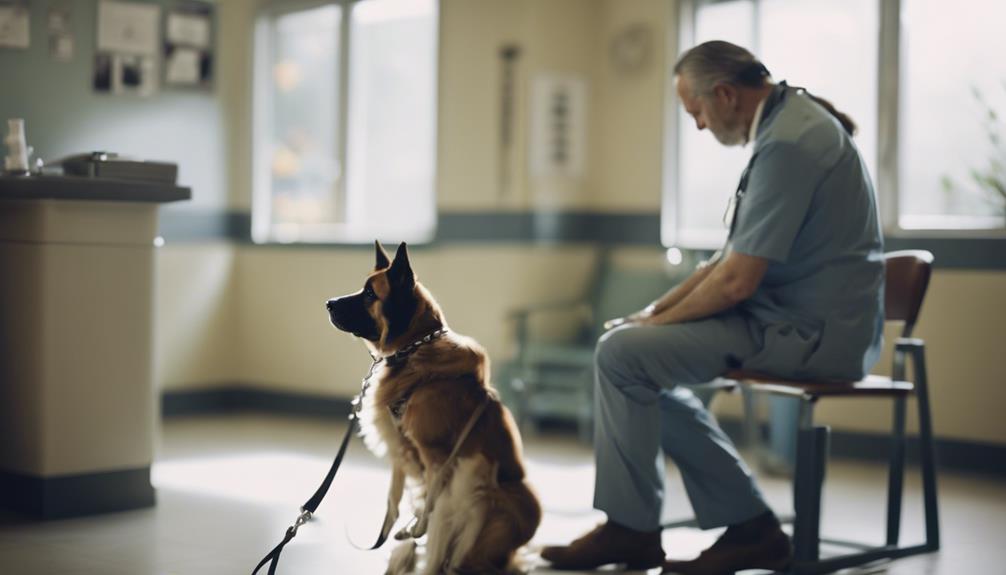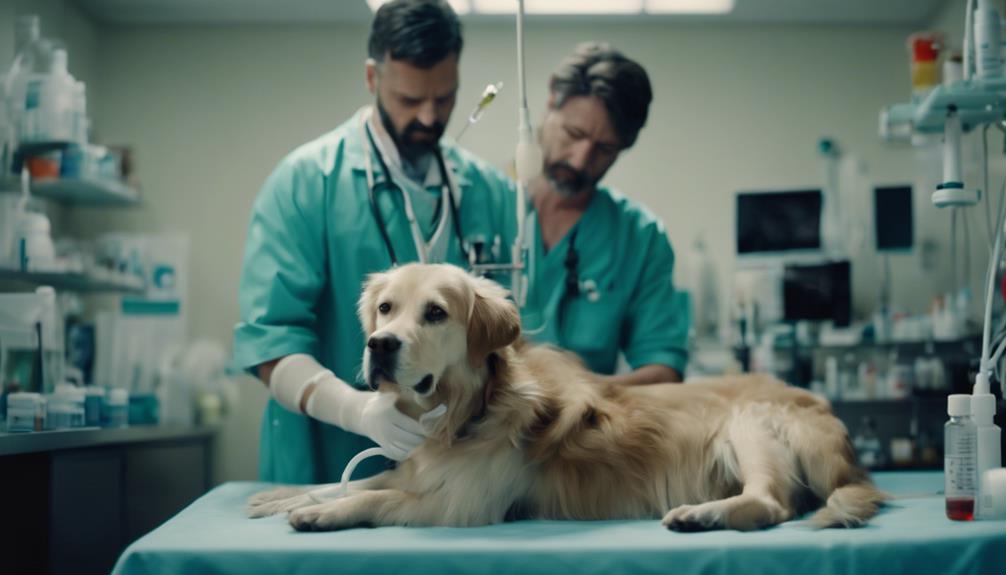Hemorrhagic Gastroenteritis (HGE) in dogs presents a complex interplay of symptoms and underlying causes that demand a comprehensive understanding for effective management.
From the distressing signs exhibited by afflicted canines to the intricate web of factors triggering this condition, the landscape of HGE warrants a closer examination.
By exploring the nuances of its presentation and the pivotal role of veterinary intervention, a deeper insight into this ailment emerges.
As we delve into the realm of HGE in dogs, a clearer path towards proactive care and treatment strategies unfolds, offering a glimpse into the multifaceted nature of combating this gastrointestinal challenge.
Key Takeaways
- HGE in dogs causes bloody diarrhea and vomiting, accompanied by fatigue, loss of appetite, and dehydration.
- Common causes include bacterial infections, dietary changes, and stress, with toy breeds at higher risk.
- Immediate veterinary care with IV fluids, antibiotics, and blood transfusions is crucial for HGE treatment.
- Prevention involves maintaining gut health, probiotics, stress management, and early detection for good prognosis.
Understanding HGE in Dogs
In dogs, Hemorrhagic Gastroenteritis (HGE) is characterized by stomach and intestinal inflammation, often resulting in bloody diarrhea and vomiting. About 80% of dogs with HGE also experience vomiting, alongside signs of fatigue, loss of appetite, and dehydration. Prompt veterinary care is crucial, as it leads to full recovery in most cases. However, without timely intervention, HGE can progress rapidly, potentially causing shock and death.
Common causes of HGE include Clostridium perfringens bacterial infection, dietary changes, toxin ingestion, pancreatitis, coagulation disorders, or immune diseases. Toy breeds like miniature poodles and Yorkshire terriers are more susceptible, with dogs under five years old or those with a history of HGE being at higher risk. Stress and anxiety can also contribute to the development of HGE in dogs.
Symptoms and Presentation of HGE
Symptoms indicative of Hemorrhagic Gastroenteritis (HGE) in dogs encompass a range of clinical manifestations that include gastrointestinal distress and systemic signs. Dogs affected by HGE may exhibit the following symptoms:
- Sudden onset of bloody diarrhea
- Vomiting, sometimes with blood
- Abdominal pain and discomfort
- Lethargy and weakness
These signs can progress rapidly, leading to severe dehydration and shock if left untreated. It is crucial for pet owners to seek immediate veterinary care upon noticing these symptoms to ensure a timely and effective treatment plan.
Understanding the presentation of HGE can help in prompt intervention and a better prognosis for affected dogs.
Importance of Veterinary Care

The pivotal role of timely veterinary intervention in managing Hemorrhagic Gastroenteritis (HGE) in dogs cannot be overstated. Dogs displaying symptoms of HGE, such as bloody diarrhea, vomiting, fatigue, and dehydration, require immediate medical attention to prevent complications like shock and death. Veterinarians play a crucial role in diagnosing HGE, determining the appropriate treatment plan, and monitoring the dog's progress throughout recovery.
Prompt veterinary care often leads to full recovery in most cases of HGE, emphasizing the importance of seeking professional help at the first sign of illness. Regular check-ups and consultations with a veterinarian can also help prevent future occurrences of HGE and ensure the overall well-being of the dog.
Causes of HGE in Dogs
Timely veterinary intervention is crucial in understanding the multifaceted causes contributing to Hemorrhagic Gastroenteritis (HGE) in dogs. While the exact cause of HGE remains unclear, several factors have been identified that may trigger this severe gastrointestinal condition:
- Clostridium perfringens bacterial infection
- Dietary changes
- Toxin ingestion
- Pancreatitis
These factors can disrupt the delicate balance of the gastrointestinal tract, leading to the inflammation and bleeding characteristic of HGE. By recognizing and addressing these potential causes promptly, veterinarians can tailor treatment strategies to best support affected dogs and improve their chances of recovery.
Risk Factors for HGE

Several factors contribute to the risk of Hemorrhagic Gastroenteritis (HGE) in dogs, including specific breeds, age, and underlying health conditions. Toy breeds like miniature poodles and Yorkshire terriers are more predisposed to HGE, while dogs under five years old and those with a history of HGE are at a higher risk. Additionally, stress and anxiety in dogs can elevate the likelihood of developing HGE. Understanding these risk factors can aid in early detection and proactive management of HGE in dogs.
| Risk Factors for HGE in Dogs | |
|---|---|
| Toy Breeds (e.g., miniature poodles, Yorkshire terriers) | Increased risk |
| Age (under five years old) | Higher susceptibility |
| History of HGE | Elevated risk |
| Stress and Anxiety | Contributing factor |
Treatment for HGE
Prompt veterinary intervention is crucial for the successful treatment of Hemorrhagic Gastroenteritis (HGE) in dogs. When dealing with HGE, the following treatment measures are typically implemented:
- Fluid Restoration: Intravenous fluids help restore hydration levels and electrolyte balance.
- Antibiotics: Prescribed to tackle bacterial infections and rebalance gut flora.
- Blood Transfusions: Necessary in cases of severe blood loss to stabilize the dog.
- Symptomatic Relief: Additional medications may be administered to alleviate symptoms and aid in the recovery process.
Veterinary Care and Recovery

Effective veterinary care plays a pivotal role in overseeing the recovery process of dogs affected by Hemorrhagic Gastroenteritis (HGE), focusing on comprehensive monitoring and tailored treatment plans. Following diagnosis, veterinarians closely monitor the dog's vital signs, hydration levels, and response to treatment.
Fluid therapy, antibiotics, and other medications are administered as necessary to address dehydration, control bacterial overgrowth, and alleviate symptoms. Veterinary professionals may recommend dietary adjustments and probiotics to support gut health during the recovery phase.
Regular follow-up appointments are essential to assess progress, monitor for potential complications, and adjust the treatment plan accordingly. With prompt and attentive veterinary care, most dogs affected by HGE can fully recover and resume their normal activities.
Clostridium Perfringens Infection
Clostridium perfringens infection in dogs is a known contributing factor to the development of Hemorrhagic Gastroenteritis (HGE), a condition characterized by severe gastrointestinal inflammation and bloody diarrhea. This bacterial infection can exacerbate the symptoms of HGE and lead to complications without proper management.
To delve deeper into this topic, consider the following key points:
- Clostridium perfringens releases toxins that damage the intestinal lining.
- Rapid bacterial growth in the gut can worsen inflammation and diarrhea.
- Diagnosis of Clostridium perfringens infection may require specific tests.
- Treatment often involves antibiotics targeting the bacteria to alleviate symptoms and aid in recovery.
Dietary Factors and HGE

The relationship between dietary factors and Hemorrhagic Gastroenteritis (HGE) in dogs is a critical aspect to consider in understanding and managing this condition effectively. Sudden dietary changes, such as switching to a new food or consuming table scraps high in fat, can trigger HGE in susceptible dogs. Certain ingredients like fatty meats or rich gravies may exacerbate gastrointestinal inflammation, leading to bloody diarrhea and vomiting associated with HGE.
To prevent HGE episodes related to diet, it is advisable to introduce new foods gradually, maintain a consistent and balanced diet, and avoid feeding high-fat or unfamiliar foods. Consulting with a veterinarian for dietary recommendations tailored to a dog's specific needs can help minimize the risk of HGE associated with dietary factors.
Prevention and Gut Health
Maintaining optimal gut health in dogs plays a crucial role in preventing and managing Hemorrhagic Gastroenteritis (HGE).
To ensure your dog's gut health is at its best, consider the following:
- Balanced Diet: Providing a balanced diet rich in nutrients supports a healthy gastrointestinal system.
- Probiotic Supplements: Incorporating probiotics can help maintain a healthy gut microbiome, aiding in digestion and overall gut health.
- Stress Management: Creating a stress-free environment and managing anxiety levels can reduce the risk of gastrointestinal issues like HGE.
- Regular Veterinary Check-ups: Early detection of any potential gut health issues through routine check-ups can lead to timely intervention and prevention of severe cases.
Stress and Anxiety Management

Effective management of stress and anxiety in dogs is crucial for reducing the risk of gastrointestinal issues such as Hemorrhagic Gastroenteritis (HGE). Stress can weaken the immune system and disrupt the balance of gut bacteria, making dogs more susceptible to digestive problems like HGE.
To help alleviate stress in dogs, providing a safe and comfortable environment is essential. Regular exercise, mental stimulation, and positive reinforcement training methods can also aid in reducing anxiety levels. Additionally, maintaining a consistent routine and ensuring proper socialization can contribute to a dog's overall well-being and resilience to stressors.
Consulting with a veterinarian or a professional dog behaviorist for personalized strategies to manage stress and anxiety in dogs is recommended to help prevent conditions like HGE.
Prognosis and Recovery
Upon prompt veterinary intervention, the prognosis for dogs diagnosed with Hemorrhagic Gastroenteritis (HGE) is generally favorable, emphasizing the importance of early detection and treatment in facilitating a successful recovery process. With timely and appropriate care, most dogs can fully recover from HGE. The recovery process may vary depending on the severity of the condition, but proactive veterinary treatment significantly improves outcomes.
To ensure a smooth recovery journey for dogs with HGE, it is essential to monitor their progress closely, follow the prescribed treatment plan diligently, and provide a nurturing environment conducive to healing. Additionally, maintaining open communication with the veterinarian and attending scheduled follow-up appointments are vital steps in managing HGE effectively.
- Timely veterinary care is crucial for a positive outcome.
- Monitoring progress and following the treatment plan diligently are key.
- Providing a nurturing environment aids in the recovery process.
- Regular follow-up appointments are essential for successful management.
Recurrence and Complications

After successful treatment of Hemorrhagic Gastroenteritis (HGE) in dogs, vigilance against potential complications and the risk of recurrence becomes paramount in ensuring long-term health and well-being for the affected canine patients.
Recurrence of HGE can happen in some cases, especially if underlying risk factors such as dietary changes, stress, or immune diseases are not addressed. Complications of HGE may include persistent gastrointestinal issues, anemia due to blood loss, or secondary infections.
Monitoring for signs of relapse, such as bloody diarrhea, vomiting, or lethargy, is crucial post-treatment. Prompt veterinary intervention upon any suspicion of recurrence can help prevent severe complications and ensure the best possible outcome for the dog's health and recovery.
Follow-Up Veterinary Visits
Regular veterinary check-ups post-treatment for Hemorrhagic Gastroenteritis (HGE) in dogs are crucial for monitoring recovery progress and detecting any signs of recurrence. These follow-up visits serve as a vital component in ensuring the long-term health and well-being of your furry companion.
During these appointments, your veterinarian will assess your dog's condition, address any lingering symptoms, and provide guidance on further preventive measures. The follow-up veterinary visits also offer an opportunity to discuss any concerns or questions you may have regarding your dog's recovery from HGE.
Stay proactive and committed to attending these check-ups to give your dog the best chance at continued health and happiness.
- Evaluate overall health status
- Discuss dietary modifications if necessary
- Monitor for any signs of gastrointestinal distress
- Review preventative care strategies
Conclusion
In conclusion, understanding the signs, causes, and treatment of Hemorrhagic Gastroenteritis (HGE) in dogs is crucial for pet owners and veterinarians.
By recognizing the symptoms, seeking timely veterinary care, addressing potential causes and risk factors, managing stress, and prioritizing gut health, individuals can navigate the complexities of HGE with greater awareness and preparedness.
Proactive measures and ongoing veterinary support are essential in ensuring favorable outcomes and minimizing the risk of recurrence and complications associated with this serious canine health condition.




